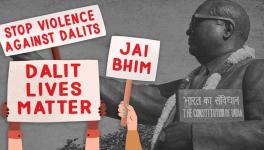Jolt to BJP in MP: HC Declares Sec 10 of Freedom of Religion Act 2021 'Unconstitutional', Passes Interim Order
Madhya Pradesh High Court. Image Courtesy: PTI
Bhopal: After two years of the MP Freedom of Religion Act 2021 being passed, the Madhya Pradesh High Court has now declared Section 10 of the Act “unconstitutional” in an interim order.
Section 10 of the MP Freedom of Religion Act 2021, or the so-called love-jihad law, mandates that an individual seeking to convert should notify the district magistrate 60 days prior to their conversion.
Sub-section (2) of the Act says that any religious priest, who intends to organise a conversion, has to give a 60-day prior notice to the DM. Those found violating sub-section 2 will be punished with imprisonment for a term varying from three to five years, along with a fine, according to the law.
The court issued the interim order on a group of seven petitions challenging the provisions of the Madhya Pradesh Freedom of Religion Act, 2021. The petitioners sought interim relief to restrain the state from prosecuting anyone under the Act.
In a 32-page order, a division bench of Justices Sujoy Paul and PC Gupta ordered, “Section 10, which makes it obligatory for a citizen desiring (religious) conversion to give a (prior) declaration in this regard to the district magistrate", is “in our opinion ex facie, unconstitutional in the teeth of aforesaid judgments of this court”.
Thus, till further orders, the respondent shall not prosecute adult citizens if they solemnise the marriage of their own volition and shall not take coercive action for violation of Section 10 of the Madhya Pradesh Freedom of Religion Act, the court order of November 14 said.
“Considering the Supreme Court judgement cited, in our considered opinion, a strong prima facie case is made out by the petitioners for grant of interim protection in relation to marriage of two adult citizens on their volition and against any coercive action for violation of Section 10,” the court said.
With an aim to prevent marriage through allurement or illegal conversion, the Madhya Pradesh government amended the MP Freedom of Religion Act 1968 and promulgated an ordinance in January 2021 by increasing jail terms and penalties, and adding other provisions. Two months later, the ordinance was passed by the Assembly in March 2021 with slogans of Jai Shree Ram inside the Assembly hall with a voice vote.
Mishra had said that the new Bill has provisions for annulling marriages conducted by unfair means. It also makes conversion a non-bailable offence, entails punishment of up to 10 years, empowers the sessions court to hear cases, and puts the onus of proving innocence on the accused. Further, it has a provision to penalise organisations and NGOs arranging and funding unlawful marriages.
In at least two cases, the police lodged FIR against inter-faith couples who had married before the new law came into existence. They pleaded before the court to keep inter-faith marriages out of the purview of the Act.
Speaking to Newsclick, advocate Himanshu Mishra, who argued in the court, said, “The law Madhya Pradesh passed in 2021 has already been in place in Gujarat since 2003. The provisions and punishments are almost identical. When challenged, the Gujarat High Court, in an order in 2021, restrained the use of a few provisions that obligate a person to notify the district collector prior to the inter-faith marriage.”
“Taking a queue from the Gujarat High Court’s order, we demanded the same in Madhya Pradesh. We also pointed out that if an interfaith couple is going to marry, their lives are already at risk. And if they notify the DM, their lives will be in jeopardy. The court agreed and passed an interim order,” he said.
He explained it further, “The Court clubbed all the seven petitions challenging the new law and had issued notices to the state government. But when the government didn’t respond within the stipulated time frame, we demanded interim relief and protection to the interfaith couple from the prior declaration of conversion.”
On the other hand, the state argued that the petitioners are claiming a blanket interim relief that cannot be granted. However, the endeavour of the court should be to uphold the constitutionality of the enactment, the Court order said.
Newsclick has reported several stories highlighting how the new law is being used to target interfaith couples. In majority of cases filed under this Act, the accused are either Muslims or Christians.
Welcoming the court’s order, an 80-year-old petitioner from Bhopal, LS Hardiniya, a social activist, said, “It was a much-needed move by the court. Marriage is a private subject and the government should not intervene in it.”
He questioned, “When we have laws to protect interfaith couples from society and family, how can the state prosecute the couple for the same?”
The HC has granted three weeks to the state to file its para-wise reply to the petitions. The court also said the petitioners might file a rejoinder within 21 days thereafter. It then listed the case for final hearing.
Get the latest reports & analysis with people's perspective on Protests, movements & deep analytical videos, discussions of the current affairs in your Telegram app. Subscribe to NewsClick's Telegram channel & get Real-Time updates on stories, as they get published on our website.
























